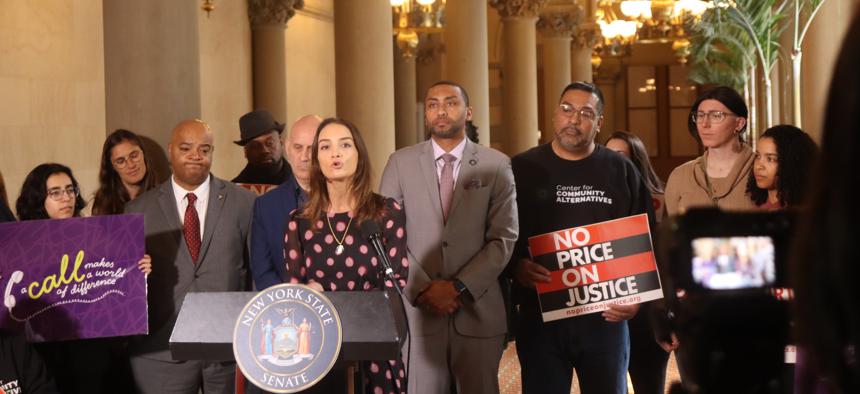New York State
Criminal justice reform push comes as state budget negotiations drag on
Advocates join in a call for passing a package of bills that make it easier to challenge wrongful convictions and ease financial burdens on incarcerated persons and their families.

New York State Sen. Julia Salazar, sponsor of the End Predatory Court Fees Act with Assembly Member Kenny Burgos, speaks at a press conference calling for the passage of a package of criminal justice reform bills on Tuesday at the state Capitol in Albany. (Image by Austin C. Jefferson)
This year, state lawmakers are hoping that Albany’s infamous budget delays become an opportunity to push for criminal justice reform. They were joined Tuesday by advocates for a package of bills meant to make it easier to challenge wrongful convictions and ease the financial burden of those affected by the criminal justice system.
“Here we are April 2, we’re a day late on the budget right? Some may look at it as a failure on our part but I look at it as an opportunity,” said Assembly Member Kenny Burgos. “I look at it as an opportunity for us to push forward.
The trio of bills included the Connecting Families Act, which would make communications in and out of state prison free; the End Predatory Court Fees Act, which would eliminate court fees, mandatory minimum fines and end the practice of garnishing incarcerated people’s commissary accounts; and the Challenging Wrongful Convictions Act, which would change the law to create improved pathways to exoneration.
Burgos said he hoped the budget would pass this week and that this extra time could be used to advocate for these bills during negotiations. A budget extender bill passed last week means lawmakers have until Thursday to pass the budget. However, that deadline can always be extended should negotiations stall.
The Challenging Wrongful Convictions Act was passed last session but ultimately vetoed by Gov. Kathy Hochul, who cited the risk of courts being flooded with “frivolous claims.” Now the bill finds itself in the state Senate’s one-house budget.
State Sen. Julia Salazar, sponsor of the End Predatory Court Fees Act with Burgos, said, “we must stop criminalizing poverty in New York State.” The common thread among the bills, aside from their interest in changing criminal justice practices, she added, was their opportunity to come out of the budget process as law.
“We have the opportunity right now to include all three of these bills in the state budget,” she said.
Connecting Families Act sponsor state Sen. Cordelle Cleare said, “I know what incarceration looks like for families,” and referenced the difficulty of mothers attempting to visit their children and vice versa.
“We punish families when we keep families apart,” Cleare added. Her bill would cost the state $9.9 million, according to the Assembly one-house budget, as the cost of communications is shifted off of incarcerated New Yorkers.
Criminal justice seemed to be on the brain, as Assembly Speaker Carl Heastie told reporters he didn’t see the efficacy of increasing penalties related to retail crime later that day. He and other leaders in the state Legislature may not have a criminal justice reform saga on par with bail reform but do have proposals to consider from the governor around retail theft and illicit cannabis enforcement. The push for these criminal justice reforms may not be as noisy for lawmakers but they signaled serious intent for the legislative package.
Burgos said, “we’re going to push until the very end.”
